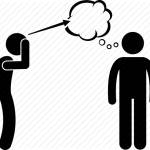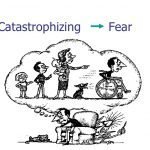Our thoughts are like an inner voice which we can either speak, write or communicate.
Sometimes due to certain experiences in early childhood, culture, or our social circle,
our thought processes can become unhealthy, irrational or distorted!
The Oxford Dictionary defines the word ‘distort’ as,
1) Pull or twist out of shape.
2) Give a misleading or false account or impression of.
We often convince ourselves that these distorted thoughts or cognition are true. This
conviction may lead to us having irrational beliefs about ourselves or others.
Since our thoughts and beliefs influence our lives, we must learn to manage them. But
before we can learn to manage them, we need to first be aware of the different ways in
which we distort our thoughts.
Luckily for us, Aaron Beck in his theory of cognitive distortions has already done most of
the work. David Burns built on his work, classified these different ways of distortions
into 15 styles, gave them common names and provided us with relevant examples.
Let’s look into each of them in detail.
1. Filtering:

• A person using this style of thinking might take the negative details and magnify
them. The person filters out all the positive aspects of a situation.
• I am sure you can think of someone who has a tendency to distort and generalise
situations in such a manner that they are not able to see anything positive? It is
probably because they’re just FILTERING everything positive.
2. Polarised Thinking:

• As the name suggests, POLAR means literally the other end – either north or south,
black or white, good or bad. Things are either perfect or a failure. There is no middle
way!
• For someone having such a thinking style, they may never be able to see the grey in
their life. If they consider someone in their acquaintance as mean or selfish then that
person is going to stay mean forever or if someone is good, they’re going to stay the
same.
• If such a person enters a race, s/he will feel good only if s/he wins since any other
outcome will seem a failure to him/her the second and third position holds no space.
3. Overgeneralise:

• Do you know someone for whom a single or couple of incidences are enough to
generalise?
• For example: If a student fails in a subject, the teacher GENERALISE that the
student is going to fail in all the papers.
4. Mind Reading:

• An example of this style of thinking would be; I may not be angry about a certain
situation or someone’s action, but my sister is READING MY MIND by stating that I
am angry right now or when someone says I know what you’re thinking.
• This style of thinking involves a person jumping to a conclusion about what the other
person might be thinking and feeling exactly in that situation.
5. Catastrophizing:

• When a person is using this style of thinking, s/he expects things to fail or end in a
disaster in the end. Their thought process comprises of “WHAT IF’s”. They will
either maximize or minimize the problem to such an extent that it won’t sound
healthy.
• If some tragedy occurs, they will keep on imagining what if it happens to them?
• Rahul is someone who thinks that if he doesn’t pass his exam, he will end up losing
his friends, and further won’t get a good job and then he will not be able to get
married and will be lonely all his life!
6. Personalization:

• This style of thinking lets people think that everyone around them is having a reaction
to everything that they are doing. They are suspicious of everyone.
• The person may also compare themselves with others, trying to understand who is
smarter, better etc. For example, Shalini thinks whenever she enters her class
everyone laughing is joking about her.
7. Control Fallacies:

• In this style of thinking, people generally have either of the following two beliefs –
about being in complete control of every situation; externally controlled and internally
controlled.
• When someone thinks they’re externally controlled they feel someone else is
controlling them. They don’t have any control on their life. They feel they are victims
of fate and luck or someone around them, who has a powerful personality, is
controlling them. Jeet thinks that because his supervisor is strict and usually not in a
good mood, he is unlucky. And so, he is going to fail his paper.
• When a person feels that everything is internally controlled, they blame themselves
for everything that is happening in their surroundings. Someone with such a style
might think that the other person is unhappy because of them! For example; Mohini
feels guilty for her best friends’ death because she cancelled her plan with Rachel, and
she went for that road trip with her other friends while Rachel met with a road
accident.
8. Fairness fallacy:

• Do you know of someone who is often resentful, angry or feels hopeless about most
of the situations? They have this belief that things will not always work out in their
favour, even when they should.
• In Fallacy of Fairness, a person becomes resentful as other people won’t agree with
what they think is fair.
• Usually, it is said that “life isn’t always fair” and few people swear by these lines and
feel it is always true in their case. Nothing is fair with them!
9. Blaming:

• A person might blame someone else for what they’re going through, specifically a bad
phase. Or blame themselves for everything wrong in their life.
• For example, when someone says ‘you are the reason I cry so much and have failed
my exams’ they are literally blaming someone else for their failure in the exams and a
low mood.
10. Should:

• Some people feel that they ‘should’ and ‘ought’ to do something that they have
decided or someone else is expected to do. Their thoughts are very rigid without any
scope of flexibility.
• The emotional consequence is guilt. When a person directs should statements toward
others, they often feel frustrated and angry.
• For example, your boss says, you SHOULD always finish your work and never
considers your shortcomings or personal struggles with the given work!
11. Emotional Reasoning:

• Have you met a few people who eat less because they ‘feel’ fat! But, they’re not fat
but they just feel like they are heavy. That is even when they have proof of their
weight, they deny it and focus more on how they feel.
• In this kind of thinking style, a person starts considering their emotions over rational
thinking, they think that ‘If I am feeling something then I should hold it true’.
• The person might not be boring or stupid but just because he or she is feeling that they
are boring they consider it as a reality! Since they felt it.
12. The fallacy of Change:

• The person expects other people to change by just pressurising them or using other
ways.
• The only aim behind doing this is the person feels if they change the other person,
they will be perfect. They place their demands on other people because their hope of
happiness depends on the other person.
• For example, a wife who tries to get her husband to improve his appearance and
manners, in the belief that her husband is perfect in every other way and he will make
her happy if he only changed these few minor things.
13. Global Labelling:

• When a person is mislabelling either someone else or themselves, it is considered
distorted thinking.
• A person using this style won’t be describing an error in the context of a specific
situation, instead, will attach an unhealthy universal label to themselves or others.
• It involves describing an event with language that is very overgeneralised and
coloured for no reason. For example, instead of saying Sheela drops her children off
at day-care every day, Sunaina says that “She abandons her children to strangers.”
14. Being Right:

• Do you know of someone who always tries to prove that their opinions and actions
are correct? Such a person would go to any lengths to prove that they’re correct.
• For example, Madhuri says “I don’t care how badly arguing with me makes you feel,
I’m going to win this argument no matter what, because I’m right.” For her, being
right often comes before the feelings of others around her, even her loved ones.
15. Heaven’s Reward Fallacy:

• The final distorted style of thinking is a false belief that a person’s sacrifice and self-
denial will eventually pay off as if some global force is keeping score.
• Some people may carry this belief that ‘because in a fair world, the people who work
the hardest will get the largest reward’. A person who sacrifices and works hard but
doesn’t experience the expected payoff, will usually feel bitter when the reward
doesn’t come.
If you are a mental health professional and want to learn how to help your clients change
automatic thought patterns and overcome limiting beliefs, check out this integrated course
in hypnosis, NLP and life coaching TODAY!